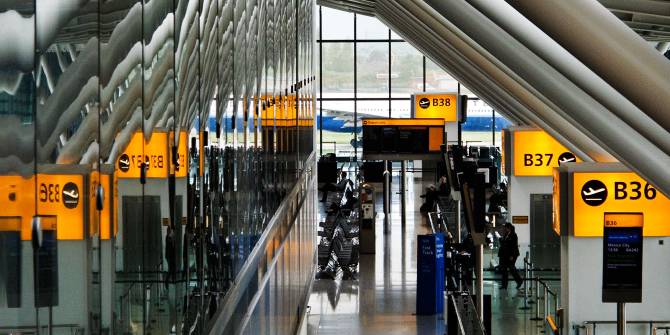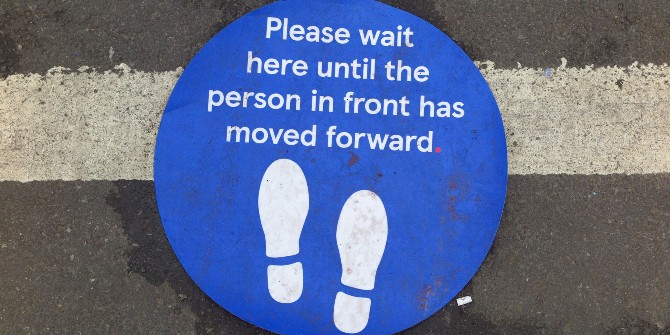Unemployment is going up and will rise further. In an extract from a new LSE Centre for Economic Performance report, Nicholas Stern (LSE) sets out how investment in zero-carbon goods and services can create jobs and redefine and strengthen Britain’s place in the world.
The pandemic has inflicted a major shock on the UK economy, with the loss of many jobs, as well as illness and tragic loss of life. With the real risk of prolonged economic damage, only strong and timely action can increase consumer and business confidence, steer expectations and channel productive private and public investment into a sustainable, inclusive and resilient recovery across the UK.

Such a recovery can be achieved while the government also tackles its other strategic challenges. Indeed, the investment needed for the recovery can be strengthened if it is part of a coherent medium and longer-term strategy. The UK was the first major economy to commit in law to achieve net-zero annual emissions of greenhouse gases by 2050, which requires transformative change across the economy. The government has also made commitments to improving productivity, investing in infrastructure, ‘levelling up’ across the country and forging a new role as ‘Global Britain’.
The combination of these medium and longer-term commitments creates a whole-economy opportunity to drive economic recovery and growth through sustainable investment, innovation and creativity, while providing international leadership on climate change. By orienting the economy towards zero-carbon goods and services, the UK can seize economic opportunities from the global transition as demand rises for zero-carbon activities.
In a new report, we focus on a series of proactive, coordinated net-zero-aligned investments that the UK can place at the heart of its plan for recovery:
• Energy efficiency in buildings;
• Natural capital projects;
• Active travel equipment and infrastructure, such as bicycles and cycle lanes;
• Renewable power generation and distribution;
• Electric vehicle production and charging infrastructure; and
• Carbon capture, utilisation and storage and hydrogen production.
In the short term, there is an urgent and immediate demand for labour-intensive and hence job-creating investments, to address the large-scale labour market displacements as the COVID-19 crisis continues to unfold and crucially, to help avoid costly and damaging labour market scarring. As at September 2020, there were 673,000 fewer people in employment compared with March 2020 and over nine million jobs were still furloughed. Redundancies have risen to their highest level since 2009, and even with extra support announced by the Chancellor in the Job Support Scheme, further large-scale redundancies are expected in the coming months as many jobs are not expected to be viable once we emerge from the crisis.
Investments in the transition to a zero-emissions and climate resilient economy can be made quickly, and would deliver significant benefits in terms of both generating employment and stimulating demand in the short term, while building productive capacity for innovation-led growth in the medium to longer term, and also helping to address climate risk and generate other attractive co-benefits.
The UK has made a strong start, setting out commitments to energy efficiency in buildings and offshore wind, but a step-change is needed given the scale of the challenge. The Prime Minister has announced his intention to produce a ten-point plan for a green industrial revolution, and this should also drive the UK’s economic recovery, including the creation of new jobs for the future. This vision for a prosperous and sustainable economy can be realised through stronger and more co-ordinated policies, incentives and institutions across skills, infrastructure and innovation, brought together with a relaunched and long-term industrial strategy, and a new National Investment Bank to help leverage sustainable private sector investments in a robust and growing economy.
A well-designed programme for a sustainable recovery should help to redefine and strengthen the UK’s place in the world. As the UK assumes the leadership of the G7 and works to deliver a successful and ambitious COP26 in 2021, a domestic economic recovery that is strong, sustainable, inclusive and resilient will provide added credibility to foster and lead collaborative efforts to build global sustainability and resilience, and accelerate the transition to zero-carbon economic growth.
This post represents the views of the author and not those of the COVID-19 blog, nor LSE. It is an extract from Jobs for a strong and sustainable recovery from COVID-19: A CEP COVID-19 analysis.






Nicholas – Where do you stand on HS2? Destroying irreplaceable habitats and not being carbon neutral for well over a century takes us in the opposite direction tackling the Climate and Ecological Emergency. Some say the final bill for HS2 could be as high as £200billion. If the HS2 budget were diverted into creating a true Net Zero economy, such as through renewables, it could create many times more jobs those of HS2 too.